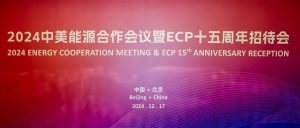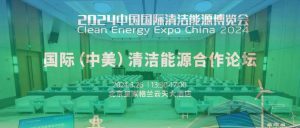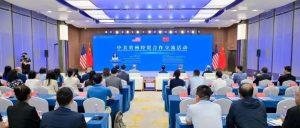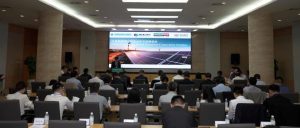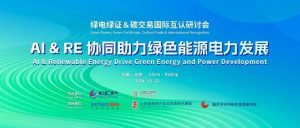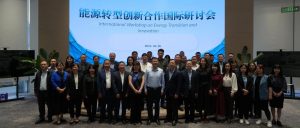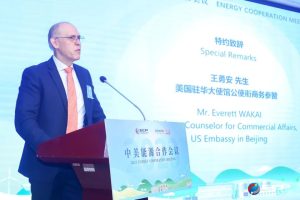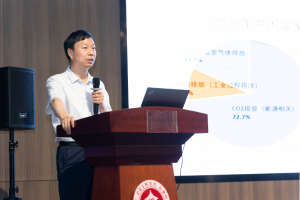On July 12th, the 2024 International Energy Sustainable Development (ESG) Forum was successfully held in Beijing. The forum was jointly hosted by the China Energy Research Society and the Energy Foundation.
Shi Yubo, Chairman of the China Energy Research Society, Zhou Ti, Director of the Market Supervision Department of the National Energy Administration, and Kaitlin Oujo, Director of the China Office of the U.S. Department of Energy, attended the forum and delivered speeches. David Vance Wagner, Vice President of Strategic Cooperation at the Energy Foundation, and Craig Allen, President of the U.S.-China Business Council, delivered video speeches. Sun Zhengyun, Vice Chairman and Secretary General of the China Energy Research Society chaired the speech session.
In his speech, Chairman Shi Yubo emphasized that this forum, themed “Promoting Sustainable Energy Development and Creating a Better Future for Humanity,” aims to delve into key issues such as technological innovation, policy adjustments, and market mechanisms in the energy sector, sharing the latest achievements and experiences in sustainable energy development to contribute wisdom and strength to global energy governance. Achieving sustainable energy development is a long-term and arduous process that requires global cooperation. He outlined three main points: innovation-driven energy technology revolution, promoting green and low-carbon energy consumption revolution, and strengthening international cooperation to build a global energy governance system.
Shi Yubo highlighted the efforts to promote green and low-carbon transformation in the energy industry and the sustainable development (ESG) information disclosure of energy enterprises. The China Energy Research Society organized energy industry experts to develop the “Energy Enterprises Sustainable Development (ESG) Disclosure Indicator System and Evaluation Guidelines” group standard. This standard includes 36 quantitative indicators and 41 qualitative indicators for the sustainable development of energy enterprises, introducing key financial indicators into the system for the first time. Quantitative evaluation accounts for 80% of the total weight, while qualitative evaluation accounts for 20%.
Based on the proposed indicator system and evaluation method, and using public information disclosed in periodic reports and sustainable development (ESG) reports by listed companies in the energy sector, the China Energy Research Society and Beijing Wanjia Green Credit Rating Co., Ltd. evaluated 636 energy companies listed on the Shanghai Stock Exchange, Shenzhen Stock Exchange, Beijing Stock Exchange, and Hong Kong Stock Exchange. After ten months of work, they compiled and released the “2024 China Energy Listed Companies Sustainable Development (ESG) Report.” The group standard has completed the process of being upgraded to an industry standard with approval from the National Energy Administration. The China Energy Research Society welcomes energy enterprises to participate in the development of this industry standard to contribute to the sustainable development of the energy industry.
In his speech, Zhou Ti, Director of the Market Supervision Department of the National Energy Administration, noted that energy is the fundamental material basis and driving force for economic and social development. Under the guidance of the new energy security strategy and important directives from President Xi Jinping, China has vigorously developed new energy productivity, comprehensively promoted energy system reforms and changes in energy consumption patterns, accelerated the construction of a diversified and clean energy supply system, and significantly advanced the green and low-carbon transformation of energy, contributing China’s wisdom and strength to global sustainable energy development.
He highlighted three main achievements: a stronger foundation for sustainable energy development, improved quality of green and low-carbon energy development, and enhanced energy technology innovation capabilities. China leads the world in installed capacities of hydropower, wind power, and photovoltaic power, and has made significant technological advancements in ultra-high voltage transmission, coal-to-liquid conversion, and intelligent mining of thick coal seams.
Zhou Ti emphasized that under the new energy security strategy, China will continue to modernize its energy governance system and capabilities, leveraging its unique regulatory advantages to build a robust and efficient energy market. He also pointed out that the world is undergoing significant changes, and global energy development trends are shifting towards green and low-carbon. China aims to collaborate with countries and entities worldwide to advance energy transformation and system restructuring, thereby contributing to global sustainable energy development.
Kaitlin Oujo, speaking on behalf of the U.S. Department of Energy (DOE), highlighted some significant legislative policies and measures for supporting clean energy, particularly like the Bipartisan Infrastructure Law and the Inflation Reduction Act, which together earmark $430 billion for clean energy initiatives providing substantial funds towards clean energy projects, including grid improvements, energy efficiency, and clean energy manufacturing, aiming for 100% carbon-free electricity by 2035 and net zero emissions by 2050. She mentioned that DOE believes that clean energy revolution should be government-enabled and private sector led and she emphasized the crucial role of private sector investment, bolstered by tax credits, in advancing clean energy technologies. While government can play the role of setting regulations and policies, the private sector brings innovation, investment, and scalability to the table. For example, the generous tax breaks for clean energy projects and the eight “Energy Earth-shots” program for accelerating breakthroughs in clean energy technologies. Due to these tax incentives and “Energy Earthshots” programs, private companies announced around $650 billion for clean energy investment and 21st Century industries, $400 billion of which are in the energy sector.
Oujo also pointed out the importance of providing significant opportunities for economic growths and social equity and ensuring fair transition for all communities for a sustainable clean energy future, aligning with the goals of the “Justice 40” Initiative for overall disadvantaged communities benefit, the DOE’s “Office of Energy Jobs” to support high-quality, unionized jobs in the clean energy sector, the DOE’s “Capacity Building for Repurposing Energy Assets” Initiative helping communities clean energy planning.
Through sharing DOE’s views and efforts about how sustainability in technology, finance and human capital, Oujo clearly addressed a more resilient and sustainable better future requiring a collective effort by sharing knowledge, resource and solutions.
During the forum, Liu Meng, Representative of the United Nations Global Compact in China, delivered a keynote report titled “20 Years of the UN Global Compact: Challenges and Opportunities in Global Energy Sustainable Development.” Other keynote speakers included Ye Yanfei, former Inspector of the National Financial Supervisory Authority, Wang Yida, Chairman of the Supervisory Board of the National Green Development Fund, and Cold Ice, Board Member of the International Sustainability Standards Board (ISSB). The keynote report session was chaired by Chen Jingdong, Chairman of the Energy Finance and Law Branch of the China Energy Research Society.
The “2024 China Energy Listed Companies Sustainable Development (ESG) Report” was officially released. Due to space constraints, only the top 100 companies’ ESG scores and values for ten key indicators, such as greenhouse gas emission intensity, comprehensive energy consumption intensity, nitrogen oxide emission intensity, sulfur dioxide emission intensity, freshwater resource consumption intensity, general solid waste emission intensity, investment in environmental protection/safety production, R&D expenditure ratio, cash dividends, and debt-to-asset ratio, were disclosed. These ten indicators account for 33.6% of the total weight of the 77 indicators. The top ten companies in the 2024 report include Sungrow Power Supply Co., Ltd., ENN Energy Holdings Limited, China Yangtze Power Co., Ltd., XJ Electric Co., Ltd., Suntien Green Energy Company Limited, Tian Lun Gas Holdings Limited, Kunlun Energy Company Limited, China Gas Holdings Limited, Tongwei Co., Ltd., and Xinyi Solar Holdings Limited.
David Giles, Head of Energy Transition and Integration at the British Embassy in China, Hou Mingyang, Deputy Director of the Planning Institute at Sinopec Petroleum Exploration and Development Research Institute, and Jakub Bednarek, former Chief Climate Policy Expert at the Prime Minister’s Office in Poland and current lawyer at Maruszkin Law Firm, delivered keynote speeches. The keynote speech session was chaired by Yu Zhigang, Deputy Chairman of the Energy Finance and Law Branch of the China Energy Research Society.
Du Xuan, Director of the Low Carbon Economy Transition Project at the Energy Foundation, chaired the “China and Foreign Energy Enterprises High-Level Dialogue” session. Participants included Chu Jingchun, Chairman of the New Energy Technology Research Institute of China Energy Group, Maggie Jia, CEO of Cheniere Energy China, Feng Wujun, Senior Expert at Beijing Energy Technology Co., Ltd., Liu Xiaomei, Senior Director of the President’s Office and Public Affairs at HPE China, Christina Borsum, CFO of New Energy Nexus, Ryan Etzcorn, Senior Director at Greenpoint Strategy Consulting, and Will Wiseman, CEO and Co-Founder of Climatize.
In the roundtable discussion session on “Sustainable Development Information Disclosure and Regulation,” chaired by Guo Haifei, Deputy Secretary-General of the Energy Finance and Law Branch of the China Energy Research Society, participants included Chan Pui Cheong, President of the Hong Kong Quality Assurance Agency, Liu Hongrong, Director of Beijing Songshan Low Carbon Technology Research Institute, Robert Earley, Director of Business Development and Strategy at SCS Global Services China, Shen Ying, Managing Partner of Energy and Natural Resources Consulting at KPMG, Tomson Xie, Vice President of Safety, Health, Environment, and Supply Chain at ConocoPhillips China, and Xu Xiaohu, Director of Investor Relations and ESG Management at Shango New Energy.
The “Energy Transition and ESG Investment” roundtable discussion, chaired by Jiang Yan, Partner and Chief Sustainability Officer at Shengshi Investment, included participants Li Shuangxia, Founding Partner of Mingde Investment, Zhang Guojin, Founding Partner of Green Capital, Chen Li, Chief Economist at the Green Finance Research Center of China Huadian Corporation, Alba Forns, CEO and Co-Founder of Climatize, Loïc Bastard, CTO and Co-Founder of Qnetic, and Yobie Benjamin, Board Member of AHG Technology and former CTO of Global Transaction Services at Citibank.
The forum was supported by various organizations, including the China Clean Air Policy Partnership, New Energy Nexus, the U.S.-China Energy Cooperation Program (ECP), the American Chamber of Commerce in China, the U.S.-China Business Council, the Global Carbon Capture Institute, Zhongke Youcheng Enterprise Management Co., Ltd., and Shengshi Investment. Over 200 participants from domestic and foreign energy enterprises, financial institutions, and media, such as State Grid, China Energy, China Huadian, China Huaneng, Three Gorges Group, China Power Investment, China Datang, Sinopec, CNPC, CNOOC, CATL, Goldwind, Shell, Cheniere Energy, ConocoPhillips China, Dow Chemical, ExxonMobil, 3M, Intel, Walmart, Marubeni Corporation, and Mitsubishi Corporation, gathered to discuss the sustainable development of the energy industry.
The forum featured an opening ceremony, keynote reports, keynote speeches, high-level dialogue between Chinese and foreign energy companies, and roundtable discussions, fostering an atmosphere of international energy exchange and cooperation. The forum received enthusiastic responses from participants.

